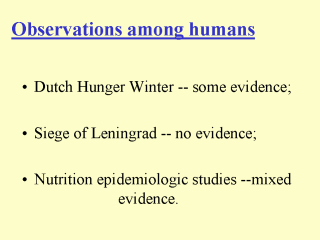 |
Human studies are not as clear, however. A frequently cited
finding is the increased cardiovascular risk in the offspring of mothers suffering from
starvation associated with the Dutch Hunger winter. Severe famine among women during
pregnancy resulted in reduced size at birth and increased risk of glucose intolerance and
obesity in adult life (Ravelli ACJ, et al. Lancet 1998;351:173-77). In contrast,
the siege of Leningrad was not associated with elevated coronary heart disease or diabetes
in offspring (Stanner SA, et al. BMJ 1997;315:1342-48). Nutritional epidemiologic
studies have also been conflicting. To date, studies of maternal intake of carbohydrates,
proteins and fats have failed to show a consistent relationship with birth weight. In
fact, higher carbohydrate, protein, and fat intake in an Aberdeen population has been
associated with an increased risk of hypertension and diabetes in the offspring. In India,
green leafy vegetables and fruit intake and circulating levels of folate and vitamin C
were strong determinants of neonatal size. |
